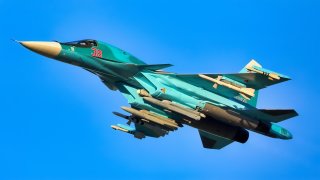Russia's Su-34 Fullback Is Becoming a Flying Coffin in Ukraine
According to the Ukraine Defense Ministry, Ukrainian forces shot down ten Su-34 fighter bombers, two Su-35 fighters, and one A-50 long-range radar detection and control aircraft.
Russia's Su-34 Fullback is in Trouble in Ukraine: The Russian invasion of Ukraine, now in year three, has not gone as planned. Failing to gain significant territories and failing to establish air superiority, Putin’s forces have revealed themselves to be an outdated fighting force with limited capabilities.
In the air war, Russian aircraft have been struggling to survive in the contest airspace above Ukraine. Notably, the Sukhoi Su-34 “Fullback” has had survivability problems; in February alone, Ukrainian forces boasted of shooting down 13 aircraft in less than two weeks – many of which were the Su-34.
“It seems like being a Russian military plane is the worst job in the world,” Ukraine’s Defense Ministry posted to X. “February is the shortest month of the year, but our sky defenders have achieved the greatest results in downing Russian jets since October 2022.”
According to the Ukraine Defense Ministry, Ukrainian forces shot down ten Su-34 fighter bombers, two Su-35 fighters, and one A-50 long-range radar detection and control aircraft.
The Su-34 is struggling to survive in Ukraine
Clearly, things are not going well for the Su-34.
The rate at which Putin is losing the Su-34 seems unsustainable and will require either some sort of adjustment or compensation. But what can be done?
“Russia’s Su-34s have been playing a key role in supporting Moscow’s winter offensive on the eastern front,” Newsweek reported.
“Air dropped KAB glide bombs have ben credited as vital to Russian success in and around the small city Avdiivka, with Ukrainian defenders lacking the air-defense capabilities to stop such sorties. Russian fighter-bombers can release the munitions from as far as 25 miles away.”
Meaning the Su-34 is crucially essential to Russian war efforts – and the downing of so many Su-34s is potentially crippling to those efforts.
In effect, Russia must make some sort of adjustment to minimize how many Su-34s are lost. Most significantly, Russia needs to minimize the impact of the systems that are causing the Su-34 losses, like Ukraine’s radar and surface-to-air missiles.
Of course, that’s much easier said than done – especially when you consider that the tools being used to eliminate Ukrainian defense systems are the very tools that Ukrainian defense systems are identifying and shooting down (i.e., the Su-34 and A-50), putting Russia in a challenging situation.
Can Russia make more Su-34s?
The easiest fix, in theory, is for Russia to stop losing Su-34s. Another easy fix, theoretically, is for Russia to make more Su-34s. But again, this is much easier said than done. “Russia’s air force has acquired a total of 140 Su-34 fighter-bombers,” Newsweek reported.
And “Ukraine claims to have downed 35 of them,” meaning Russia has about one hundred Su-34s remaining. But just because Russia has one hundred Su-34s doesn’t mean that Russia has one hundred flyable Su-34s. Many jets may be out of service or lack sufficiently trained pilots.
Of course, flying the jets increases the likelihood that they will be shot down, further exacerbating the shortage.
Moreover, whereas Ukraine may rely on Western allies to help replenish stocks of depleted aircraft, the Russians are on their own and forced to make up the deficit domestically.
About the Author: Harrison Kass
Harrison Kass is a defense and national security writer with over 1,000 total pieces on issues involving global affairs. An attorney, pilot, guitarist, and minor pro hockey player, Harrison joined the US Air Force as a Pilot Trainee but was medically discharged. Harrison holds a BA from Lake Forest College, a JD from the University of Oregon, and an MA from New York University. Harrison listens to Dokken.


